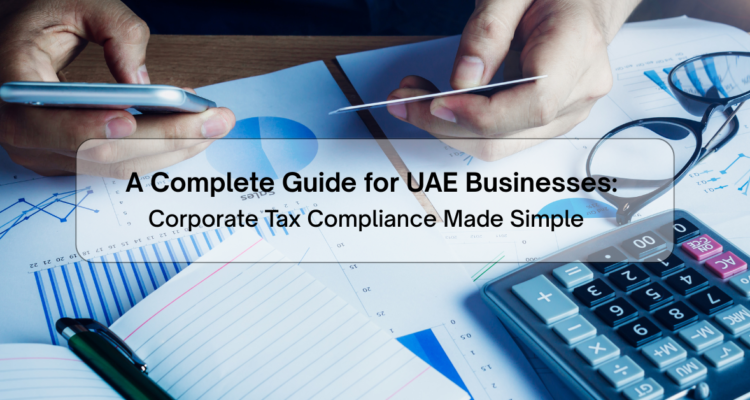The United Arab Emirates (UAE) is an attractive destination for UK entrepreneurs, offering a strategic…

Corporate Tax Compliance Made Simple: A Complete Guide for UAE Businesses
In today’s dynamic regulatory environment, staying compliant with corporate tax laws is not just an obligation; it’s a strategic move that can safeguard the longevity and success of your business. Whether you’re a startup, small and medium-sized enterprise (SME), or a large corporation in the UAE, understanding and meeting your corporate tax obligations will protect you from unnecessary penalties and build a solid reputation with investors, customers, and regulators.
At Global Business Konsultancy, we firmly believe that corporate tax compliance doesn’t have to be overwhelming. By following a clear, structured approach, your business can meet its tax obligations and position itself for continued growth. This comprehensive guide outlines the essential steps and best practices to help UAE businesses achieve corporate tax compliance with confidence.
What is Corporate Tax Compliance?
Corporate tax compliance refers to the process by which businesses ensure they adhere to the legal requirements imposed by the UAE government regarding corporate income tax. This includes several crucial tasks:
- Registering for Corporate Tax: All businesses must officially register for corporate tax with the Federal Tax Authority (FTA), ensuring they are recognized as tax-registered entities.
- Maintaining Accurate Financial Records: A well-organized and transparent record of all business transactions is vital. This includes invoices, receipts, and accounting statements that clearly track the movement of funds and business activities.
- Filing Tax Returns on Time: Companies are required to submit annual corporate tax returns that detail income, expenses, profits, and tax liabilities. Meeting deadlines is key to avoiding penalties.
- Calculating Tax Liability Correctly: Businesses must ensure they accurately compute their tax liability, factoring in allowable deductions, exemptions, and any other tax considerations relevant to their business model.
- Submitting Payments and Documentation as Required: Businesses must make timely payments to the government and submit necessary documentation as part of their tax compliance. Failure to do so could result in hefty fines and legal consequences.
Why Corporate Tax Compliance Matters
Failure to meet corporate tax obligations can have serious repercussions. Some of the most significant risks include:
- Financial Penalties: Late registrations, inaccurate tax filings, or missed deadlines often result in heavy fines. For instance, the UAE imposes a fine of AED 10,000 for late corporate tax registration. This is only one of the many penalties businesses may face for non-compliance.
- Legal Consequences: Ongoing non-compliance could result in legal action against your business, potentially including audits, court orders, or restrictions on business operations.
- Loss of Trust: Investor confidence and public trust are integral to business success. Failing to meet tax obligations could damage your company’s credibility, leading to a loss of both customers and partners.
The UAE government has also launched penalty waiver programs to assist businesses in meeting their compliance obligations, which makes now the perfect time for companies to ensure their tax affairs are in order.
5 Simple Steps to Ensure Corporate Tax Compliance
Staying compliant with corporate tax regulations in the UAE might sound complex, but breaking it down into clear steps can make the process manageable. Here are 5 simple steps to ensure corporate tax compliance:
1. Know Your Obligations
Understanding whether your business falls within the scope of UAE corporate tax laws is the first step. The new corporate tax regime applies to all UAE-based businesses with revenues exceeding a certain threshold. Be sure to assess if your business is subject to the tax and what specific rates or exemptions may apply to you.
Key Factors:
- Businesses with annual income exceeding AED 375,000 are liable for corporate tax.
- Specific rules apply to Free Zone companies, which may be eligible for exemptions depending on their activities.
2. Register Early
Early registration for corporate tax with the Federal Tax Authority (FTA) is crucial. The registration process must be completed before any taxable activity is undertaken. Delaying registration can result in automatic penalties, which can significantly increase the costs for your business.
How to Register:
- The FTA provides an online platform for tax registration. Make sure to gather all necessary documentation and complete your registration promptly.
- Consulting with an expert or tax advisor is recommended to ensure everything is done correctly.
3. Maintain Accurate Financial Records
One of the most critical aspects of tax compliance is maintaining organized financial records. Proper bookkeeping will make tax filing easier and protect you in the event of an audit. All transactions, expenses, and revenues must be carefully logged and preserved.
Best Practices:
- Use professional accounting software to track and organize your finances.
- Ensure all invoices, receipts, and payment details are accurate and readily available for review.
4. File Returns On Time
Timely submission of tax returns is essential to avoid penalties. Businesses must file their corporate tax returns annually, providing a detailed breakdown of income, expenses, and profits.
Key Deadlines:
- Corporate tax returns are typically due within 9 months of the end of your financial year.
- Prepare in advance by tracking all relevant deadlines and submitting your filings well before the due date to avoid last-minute delays.
5. Get Expert Guidance
While managing corporate tax compliance internally is possible, partnering with a qualified tax consultant can simplify the process. Tax experts can help you understand the intricacies of tax regulations, ensure accurate filings, and provide advice on tax optimization strategies that could reduce your liability.
Benefits of Expert Guidance:
- Minimizes the risk of errors in tax returns.
- Provides ongoing monitoring to ensure continuous compliance.
- Assists in identifying opportunities for tax savings and incentives.
Common Mistakes to Avoid
There are several common mistakes businesses make that can jeopardize their tax compliance. These include:
- Ignoring Registration Deadlines: Not registering for corporate tax within the required time frame can lead to severe penalties, which could have been easily avoided with early action.
- Mixing Personal and Business Finances: Keeping personal and business finances separate is essential. This ensures that the financial records you submit to the FTA are accurate and comply with tax regulations.
- Failing to Maintain Bookkeeping Standards: Inaccurate or incomplete financial records can lead to difficulties during audits, and mistakes in tax filings could lead to fines or legal action.
- Misclassifying Income and Expenses: Misclassifying your business expenses or income can lead to incorrect tax returns, potentially resulting in fines and audits.
Who Needs to Comply?
All businesses operating in the UAE must determine whether they are required to comply with corporate tax regulations. This includes:
- Mainland Companies: Businesses established in the UAE mainland are fully subject to the corporate tax regime if they meet the relevant criteria.
- Free Zone Entities: Free zone businesses may be subject to tax, but specific conditions apply. Many free zones offer tax exemptions, but these can vary based on the nature of the business and its activities.
- Branches of Foreign Companies: Foreign entities with branches in the UAE are also required to comply with the corporate tax law, with special provisions depending on the type of activity conducted.
Real Impact: Stats That Matter
- Over 600,000 businesses in the UAE are required to register for corporate tax, which represents a significant portion of the country’s private sector.
- The penalty for late registration is AED 10,000, and businesses can face even more severe consequences if they fail to file tax returns or misreport their income.
- 50% of businesses remain unaware of their full corporate tax compliance responsibilities, which underscores the importance of education and expert guidance in navigating the tax landscape.
How Global Business Konsultancy Can Help
Navigating corporate tax compliance doesn’t have to be overwhelming. At Global Business Konsultancy, we specialize in helping businesses manage their tax obligations seamlessly. Our services include:
- End-to-End Corporate Tax Registration: We guide you through the entire registration process with the FTA to ensure that your business is compliant from the start.
- Bookkeeping and Financial Advisory: Our team ensures that your financial records are meticulously maintained, providing support for audits and tax filings.
- Timely Tax Return Filing: We track deadlines and manage your tax return submissions, ensuring you file on time and avoid unnecessary penalties.
- Penalty Waiver Assistance: In light of government penalty waivers, we help businesses take advantage of these programs, minimizing financial penalties for late registration.
- Ongoing Compliance Monitoring: We provide continuous oversight to ensure that your business remains compliant with any evolving tax laws or regulatory changes.
Ready to Simplify Tax Compliance?
Corporate tax compliance doesn’t have to be stressful. Let’s make the process easier for you. Contact us today to book a free consultation and take the first step toward streamlined tax management for your business.
- Phone: +971 55 457 5540
- Email: info@konsultancy.co
- Book your Free Consultation: www.konsultancy.ae/free-consultation/
Corporate tax compliance isn’t just about avoiding penalties. It’s about building a future-ready, financially sound business. Let us simplify it for you.




